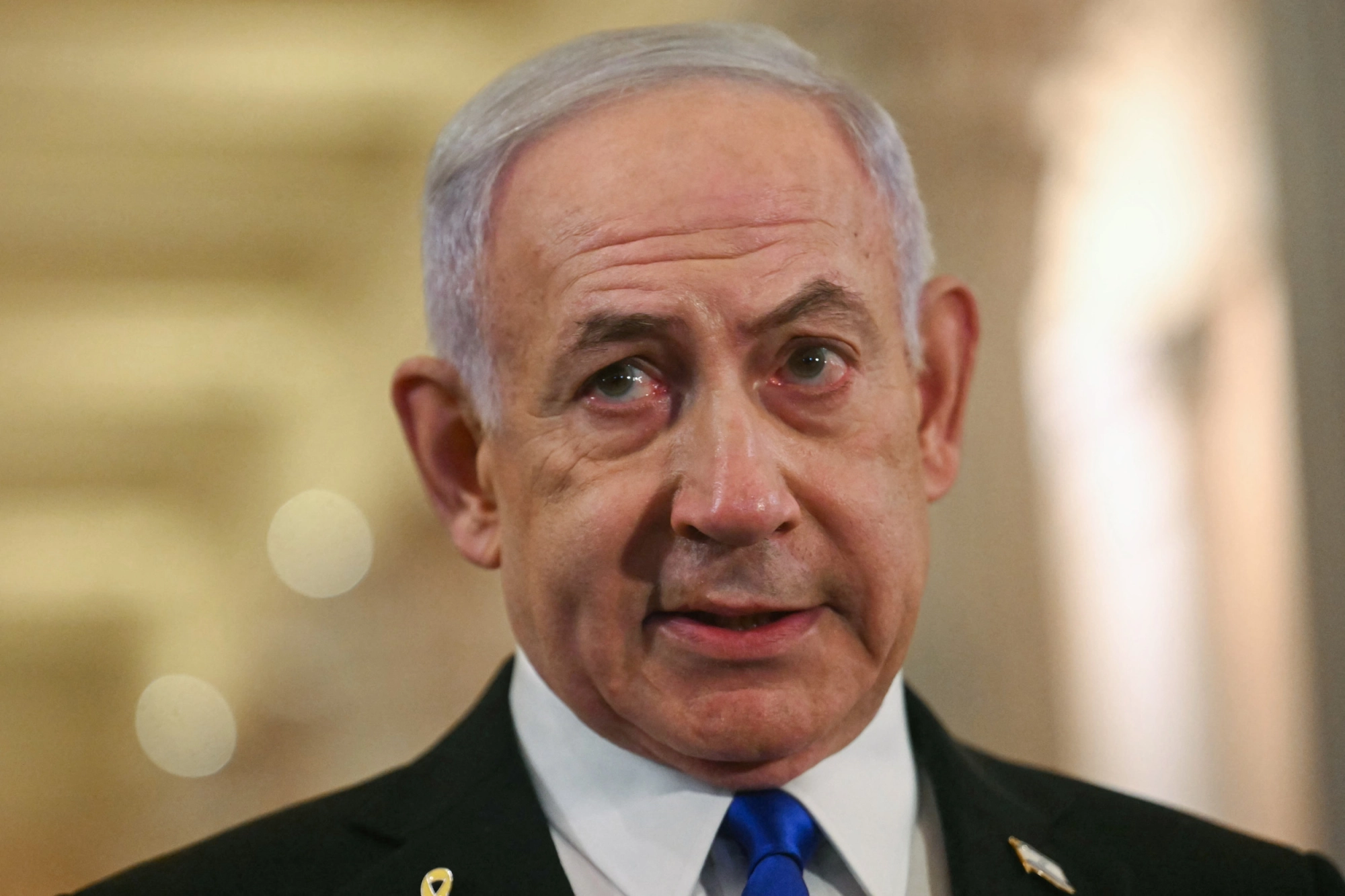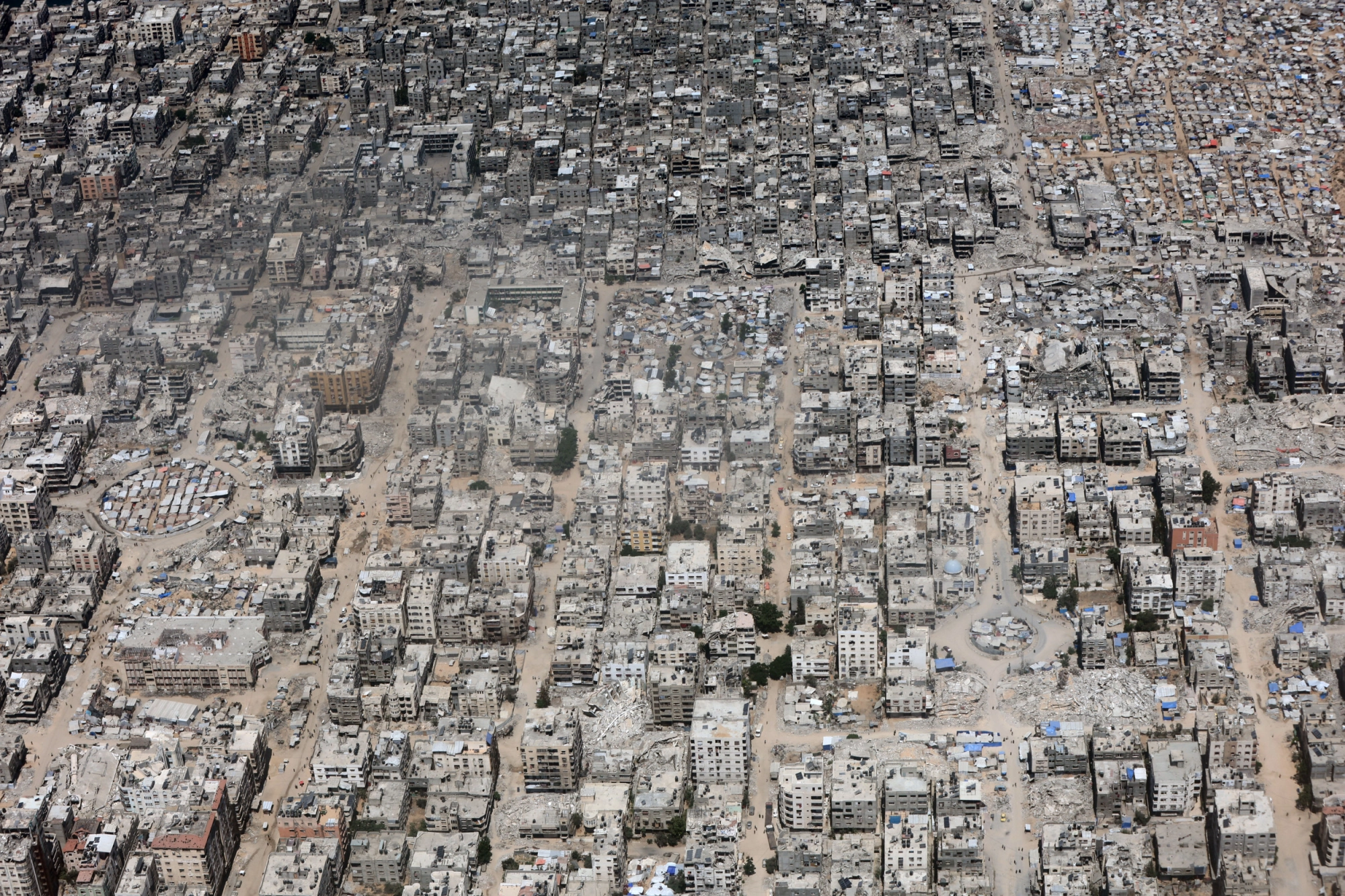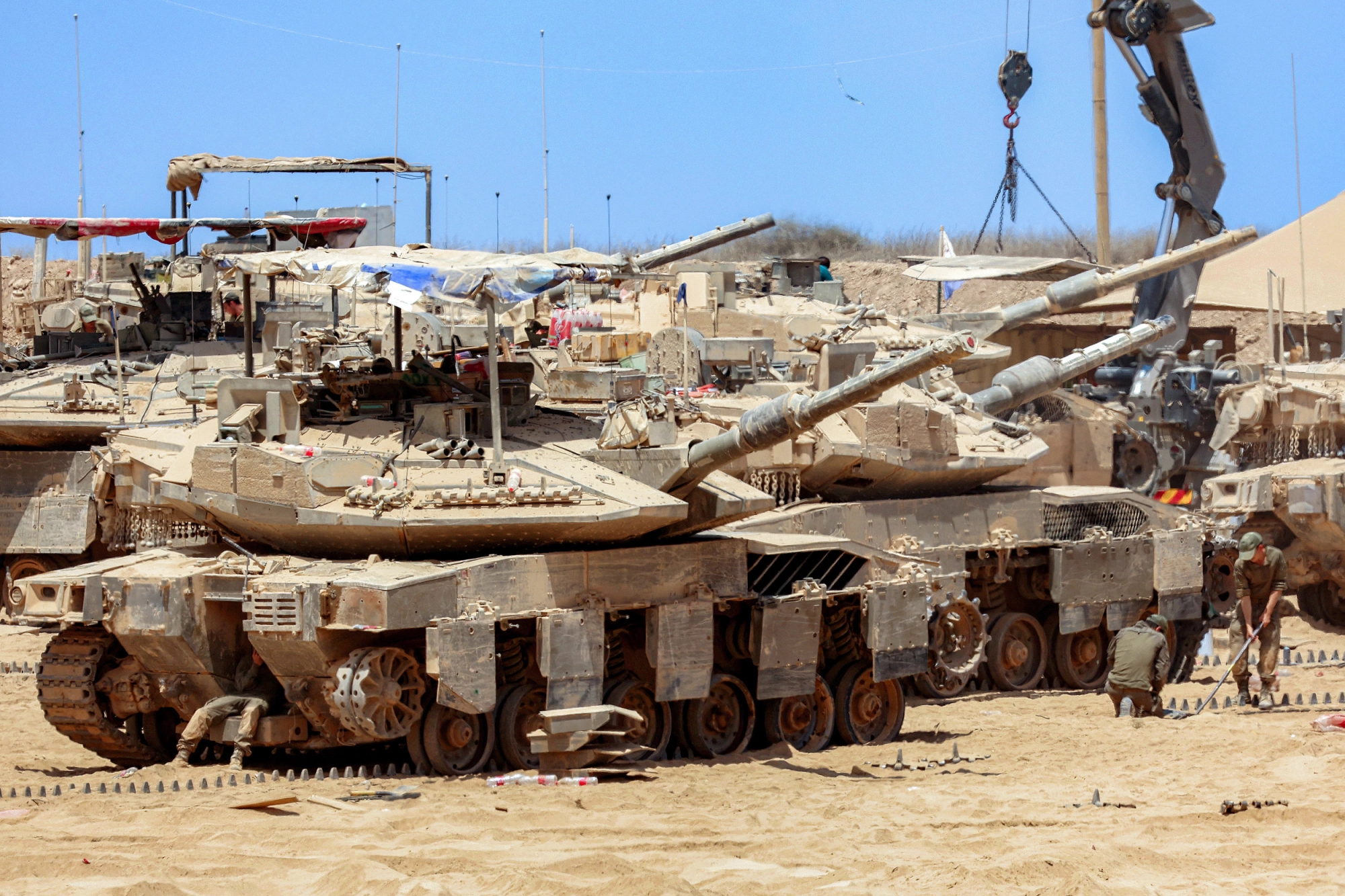Israel's Security Cabinet approved a plan to take over Gaza City and eventually implement "Israeli security control" of the entire Gaza Strip, Prime Minister Benjamin Netanyahu's office said in a statement early on Friday.
Gaza City is in the north of the 26-mile coastal enclave and has been largely devastated by Israeli military strikes over the past 22 months.
Why It Matters
The Security Cabinet's decision capped months of failed ceasefire talks between Netanyahu's government and Hamas, with both sides accusing each other of repeated violations.
Israel has also faced increased international pressure to reach a ceasefire deal after Hamas released videos showing emaciated Israeli hostages being held in Gaza, which the group said was the result of Israel's blockade of humanitarian aid to the war-torn territory.
After the videos were released, Netanyahu said he would convene a Cabinet meeting to discuss how Israel can meet the three main goals he set out for the war: defeating Hamas, returning the hostages and ensuring Gaza does not pose a threat to Israel.
The Israel Defense Forces (IDF) leadership has expressed strong resistance to a full-scale ground reoccupation of Gaza, according to multiple Israeli officials. Expanding military operations would also further isolate Israel internationally as several of its closest Western allies have called on it to end the war and facilitate more humanitarian aid.
 Israeli Prime Minister Benjamin Netanyahu speaks with reporters at the U.S. Capitol in Washington, D.C., on July 8.
Israeli Prime Minister Benjamin Netanyahu speaks with reporters at the U.S. Capitol in Washington, D.C., on July 8.
Jim Watson/AFP/Getty Images
Israeli Prime Minister Benjamin Netanyahu speaks with reporters at the U.S. Capitol in Washington, D.C., on July 8.
Israeli Prime Minister Benjamin Netanyahu speaks with reporters at the U.S. Capitol in Washington, D.C., on July 8.
Jim Watson/AFP/Getty Images
What To Know
Israel's military says it controls about 75 percent of Gaza. Most of its population of about 2 million has been displaced multiple times in the past 22 months, following Hamas' devastating October 7, 2023, attacks that claimed the lives of as many as 1,200 Israelis, most of them civilians.
Aid groups are warning of looming famine in Gaza.
Netanyahu's office said early on Friday that the Security Cabinet had "approved the Prime Minister's proposal for defeating Hamas."
"The IDF will prepare for taking control of Gaza City while distributing humanitarian assistance to the civilian population outside the combat zones," the office said in the statement on X.
Netanyahu's office added that a majority of the Security Cabinet adopted "five principles for concluding the war." The principles were disarming Hamas; having all hostagesliving and deadreturned to Israel; the "demilitarization of the Gaza Strip"; Israeli "security control in the Gaza Strip"; and the "establishment of an alternative civil administration that is neither Hamas nor the Palestinian Authority."
Tens of thousands of Palestinians have been killed since Israel launched its counteroffensive in the territory in October 2023.
 A view of Gaza from the air as a Jordanian C-130 military aircraft drops aid and humanitarian supplies on August 6.
A view of Gaza from the air as a Jordanian C-130 military aircraft drops aid and humanitarian supplies on August 6.
Salah Malkawi/Getty Images
A view of Gaza from the air as a Jordanian C-130 military aircraft drops aid and humanitarian supplies on August 6.
A view of Gaza from the air as a Jordanian C-130 military aircraft drops aid and humanitarian supplies on August 6.
Salah Malkawi/Getty Images
Friday's vote by the Security Cabinet came hours after Netanyahu said Israel planned to occupy all of the Gaza Strip and eventually hand over control of it to friendly Arab forces opposed to Hamas.
In an interview with Fox News on Thursday, Netanyahu was asked whether Israel would take control of all of the enclave.
"We intend to," the Israeli leader responded. He emphasized that the goal was not to occupy Gaza permanently but to remove Hamas and allow for new leadership "that is not Hamas and not anyone advocating the destruction of Israel."
"We don't want to keep it. We want to have a security perimeter. We don't want to govern it. We want to hand it over to Arab forces that will govern it properly," he added.
Expanding military operations in Gaza would put the lives of countless Palestinians and the roughly 20 remaining Israeli hostages at risk while further isolating Israel internationally.
The prime minister has faced opposition, including from within his own country, to increasing the IDF's operations in the Gaza Strip.
Behind the scenes, the Israeli military leadership has been pushing for an alternative to the plan for a Gaza takeover, Israeli officials have said.
IDF Chief of Staff Eyal Zamir has been resisting a full ground takeover, advocating instead for a strategy that would encircle remaining Hamas-held areas while conducting airstrikes and raids.
British Prime Minister Keir Starmer said the Israeli plan would "do nothing to bring an end to this conflict or to help secure the release of the hostages."
"The Israeli government's decision to further escalate its offensive in Gaza is wrong, and we urge it to reconsider immediately," Starmer said in a statement. "It will only bring more bloodshed."
He added: "What we need is a ceasefire, a surge in humanitarian aid, the release of all hostages by Hamas and a negotiated solution."
What People Are Saying
Apparently referring to IDF Chief of Staff Eyal Zamir's proposal, which would avoid occupying the Gaza Strip, Israeli Prime Minister Benjamin Netanyahu's office said: "A decisive majority of Security Cabinet ministers believed that the alternative plan that had been submitted to the Security Cabinet would neither achieve the defeat of Hamas nor the return of the hostages."
Ahmed Fouad Alkhatib, a senior fellow at the Atlantic Council, told the BBC: "To me, this reeks of the risk of a prolonged insurgency that's going to go nowhere. That's going to displace roughly a million people. & I worry about this being a prelude to the introduction of settlements in northern Gaza, per the objectives of some of the far-right ministers in Israel's government."
Doron Kempel, a former deputy commander of an IDF special operations unit, told the BBC: "I think this move is bad news in the short term for everybody in the field. & IDF combatants, hostages, Palestinians and Hamas. Everybody is going to be in this meat grinder, and it's going to be terribly tragic for everyone involved in the short term."
What Happens Next
Netanyahu is likely to face more protests at home against an expanded war and demands for an immediate end to the military campaign in return for the release of all the hostages. The Hostages and Missing Families Forum, which represents captives held in Gaza, is likely to again urge Zamir to oppose widening the war.
The Associated Press contributed reporting to this article.
Update 8/8/25 4:07 a.m. ET: This story has been updated to include more information.
Update 8/8/25 5:55 a.m. ET: This story has been updated with new images.





